Annual Report 2012
(Excerpt: For the complete report please write to Epona-Stiftung für Pferd und Umwelt c/o Mermagen, Kesselstr. 15, 53797 Lohmar)
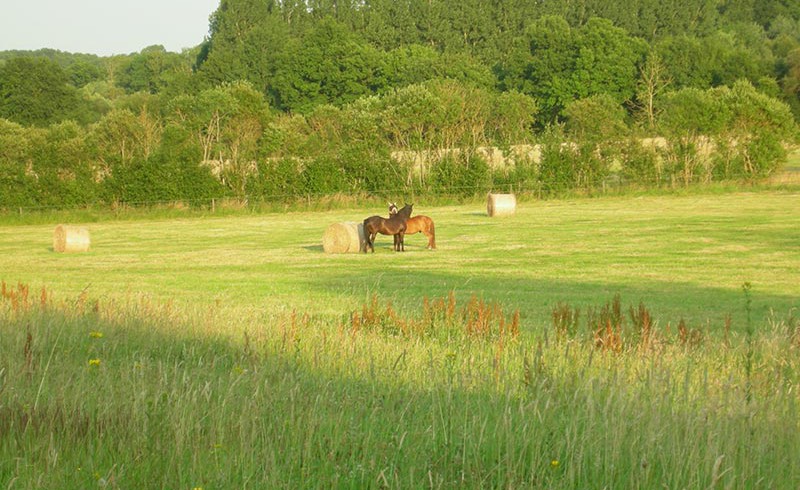
International connections, ideas, and funding projects
Already in 2011, the foundation’s website, which can be visited on the Internet at www.epona-foundation.org, was extended by a version in French. In 2012 followed further updates to make the annual reports of the foundation available on the Internet, too. It is our concern to make the foundation accessible for those interested and seeking help and to reveal our goals, strategies and promotional ideas, but also the success of our work. Help is needed – more urgent than ever. A crucial point though is: Help is possible – for horses and humans. To spread this, we convey it in personal contact and bring it to life by enabling people to gain their own experiences. In this manner we strive for the purposes of the foundation. “People help horses – horses help people”, this keynote of the foundation’s work led Marlies Kamps 2012 on her travels to France, Spain and Italy to make new contacts and find new options of cooperation and direct funding.
In February Marlies Kamps flew to Soiano del Lago, Italy, where she presented the work of the Epona – Foundation for Horse and Environment at the meeting of the “International Centered Yoga Association”. The Epona Foundation was accepted as a member of the ICYA and several ways of collaboration were discussed. As early as 2013 ICYA wants to hold seminars at the foundation with its horses.
The interest in horse assisted work in the context of personal development, leadership and therapy has experienced an enormous upswing in recent years. Mainly through the acquaintance with Eva Reifler via the Moroccan Berber horses and by sharing with the team of “visionpure” and its facility near Paris
(www.visionpure.fr), the foundation received repeatedly visitors in spring and summer, who showed their interest in cooperating with us. Jean Claude, a French psychologist, who claimed to work in equine assisted therapy, invited us to a seminar. A participation in the foundation, however, failed due to different basic conceptions. A further cooperation with experts in this field still remains possible. We will continue to hold out in this direction.
La Chevrie
In 2012, the Epona family has changed and grown. The two Berber mares Indu and Aloha came to the foundation from Morocco. Calin died in autumn of a malignant liver tumor. The brave Kham became 30 years old. In December, he did not get up anymore. The little Fanny grieved greatly for her companion. We put her to Kosmos and Tschykas, and she let herself be comforted by her old friend. Meanwhile, the three make a good team.
In spring we brought the two male ponies Toby and Cookie from a field in the west of Normandy. Her owner had moved to England, and the two were left there. She had asked a friend to give them away. As no one would accept this “present”, she called the Epona Foundation. The two ponies, described as “angels”, turned out to be little “devils”, which neither knew how to go on a leash, nor to even to lift the hooves. As a precaution, we secured the fence with electric tape, to stop them from jumping over the fence to the lovely Trakehner mares. They beat and kicked heavily, until they – after weeks of patient work – realized that nobody wanted to do them any more harm.
In summer, Liliane, Chris and Rachel helped to provide the foundation horses. The young people from Germany, France and England wanted to be active and work in animal welfare during their holidays. They had learned about the Epona Foundation from contacts and on the Internet. Especially Liliane and her partner Chris knew their way around horses and they were a big help. Chris had fallen in love with the ponies and worked almost daily with Toby, so that soon the little “devil” calmly walked on the leash, stopped and stepped back, when he was asked to.
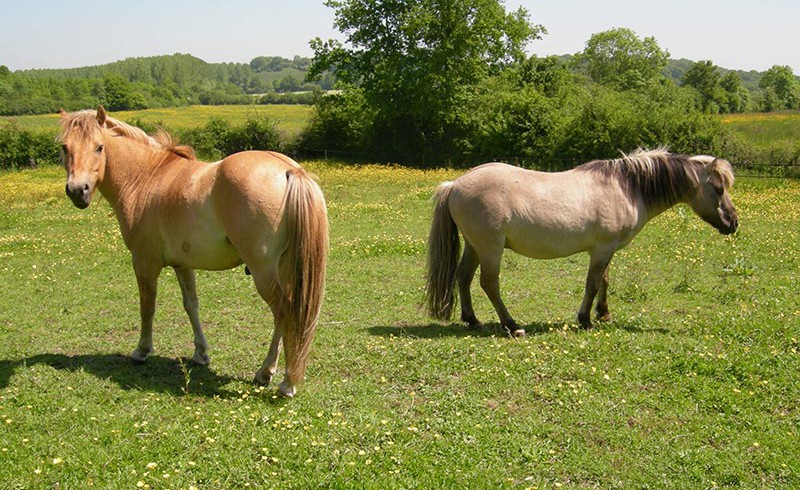
In the end of August 2011, Petra, a fully qualified groom, and Sascha, a social worker, had arrived at La Chevrie in an old mobile home on their journey through Europe. They were visiting animal welfare projects and helped with the daily work. Also for us they were a great help. On the 15th of March 2012 Petra and Sasha left. For more than half a year they had been caring lovingly for the foundation’s horses and helped us every day, whenever it was necessary. THANK YOU SO MUCH!
Indu and Aloha
In 2011, we had realized our plan to buy and thus free Indu and Aloha, two neglected Berber horses in Morocco. In the annual report of 2011, we reported in detail. At first the intended transfer of the animals to Europe had failed. In spring 2012 it finally happened: Indu, Aloha and other horses from the same farm could leave the country. Until the last moment it was uncertain whether the van was allowed to board on the ferry in Tangier; the telephone wires ran hot throughout the night. When the truck finally arrived at Magda Dysli‘s Hacienda Buena Suerte in Andalusia and all the horses were exhausted but healthy, the relief was great. Since 2010 we had strived to bring these horses to Europe. Aloha, Indu’s daughter had spent her first years with her mother in a cramped, dark barn, which had never been cleaned. In a correspondingly poor condition are their hooves. The results are permanent hoof abscesses and even relapses of laminitis. In August Indu gave birth to a little male foal, which died after a week on the way to the clinic. We could not determine the cause. Both mares are on the farm of master upholsterer Petra Langlitz in Andalusia, who lovingly cares for our horses.
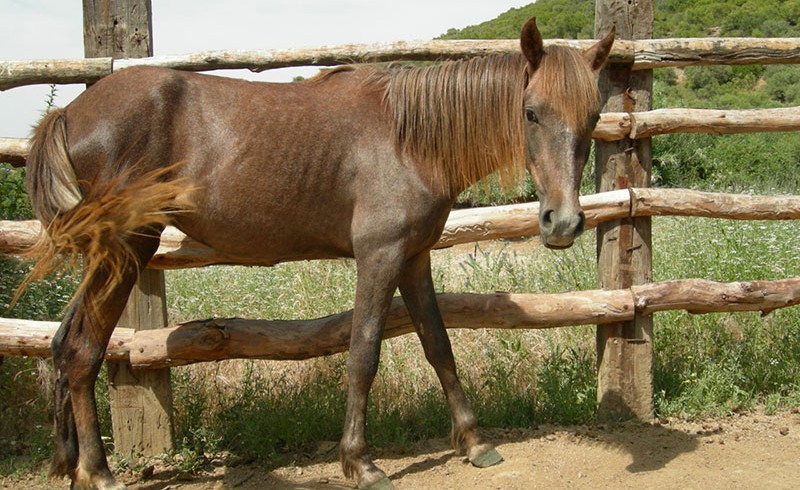
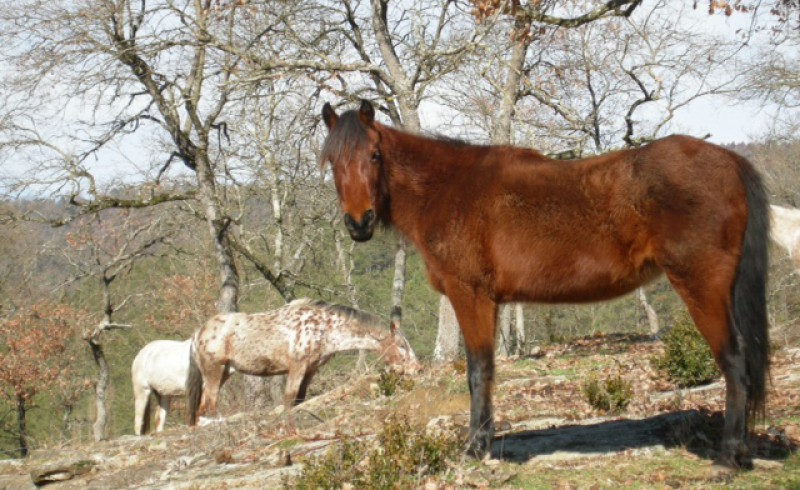
In September Marlies Kamps again traveled to Spain. At Sta. Eulalia del Rio she contacted the group of equine therapy “cabalgando sonrisas”, which belongs to the non-profit organization for disabled APNEEF. Marlies supported the group in their practical work, led the therapy horse and performed small workouts with him. After consultation with the board of trustees, the Epona Foundation decided to sponsor a new therapy horse for the group. Maie, a worn trotter, which was facing the slaughterhouse, was selected. With a grant from the Epona Foundation a ground for two horses was fenced, a shelter was built and hay for the two animals was bought. On the 27th of October 2012 Marlies Kamps wrote to Annie Hasemanns, the International Program’s Adviser of the UERE project: “Here at Ibiza, we support a project of equine therapy and I’m helping the therapist at work. It is deeply satisfying to see, how much mentally and physically disabled children change positively in contact with animals, in this case with horses. They suddenly become alert and quiet and, when they ride the horse, they go almost devoutly with its movements.”
In July Marlies Kamps completed a course held by the equine osteopath Silvia Marti Korff in Catalonia, northern Spain to learn the cranio-sacral therapy for horses. During this journey, she also got to know the horse expert Lucy Rees, Talia Soldevila Nightingale, who applies and teaches equine-assisted coaching and Yuna McLister, who teaches “Natural Horsemanship”. The exchange with these horse- women was not only helpful in terms of technical issues, but also enlarged the network of the foundation, concerning interchange and support of professionals in relation to animal/equine protection.
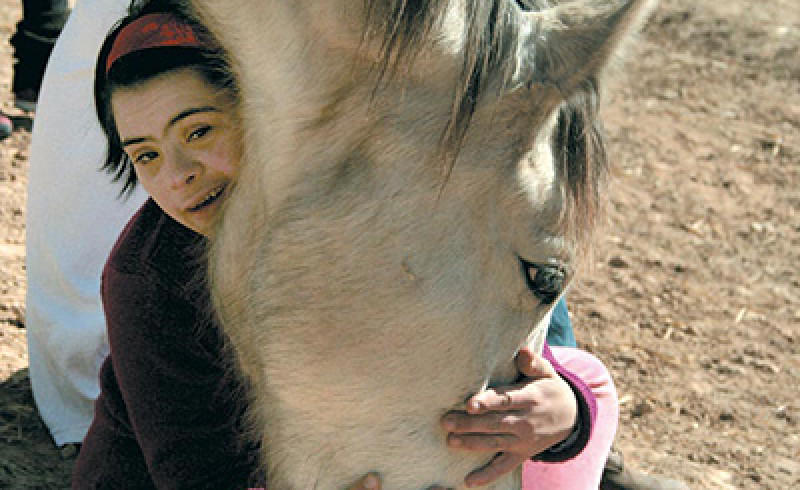
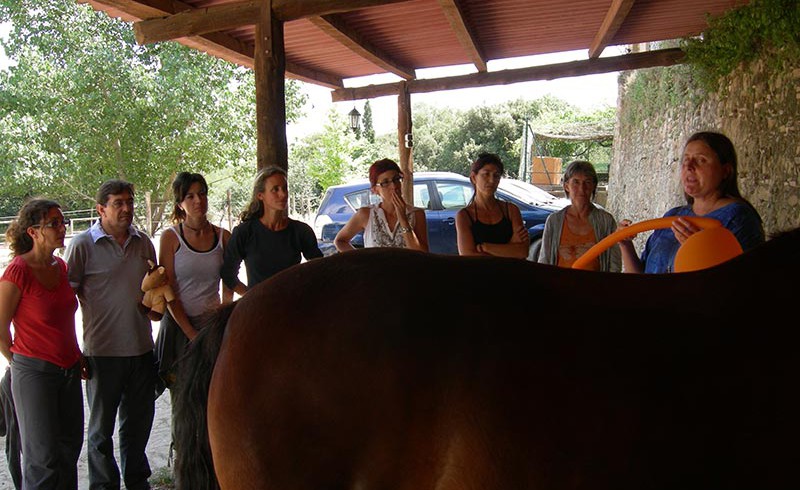
Eritrea
In this context, Annie Hasemanns reported the ARCHEMED project in Eritrea. With the help of the charity ARCHEMED Doctors for children in need (www.archemed.org) and in collaboration with local organizations, which dispose of networks connecting the whole country, destitute single mothers are selected and registered, to give them a donkey. They agree not to sell the donkey and to take good care of the animal. Every six months, the family’s situation will be reviewed and documented. Only female donkeys are purchased, as they can have offspring. They help the mothers and daughters in their daily work, carrying water, firewood, the children, merchandise, and the sparse harvest. A donkey in Eritrea costs about 250 euros, which is a fortune compared to, e.g., a nurse’s monthly income of between 30 and 50 euros. Annie Hasemanns, who repeatedly went to Eritrea, reported on the poverty of the rural population and on the misery of children in particular. The donkeys were undemanding and with their offspring a little prosperity could occur. Annie Hasemanns said: “I believe that this project will prove popular. The first five donkeys will be bought on arrival with the help of Eritrean staff and handed over to the selected women in three villages”. Spontaneously the Epona Foundation decided to support this project with funds for the purchase of two donkeys.
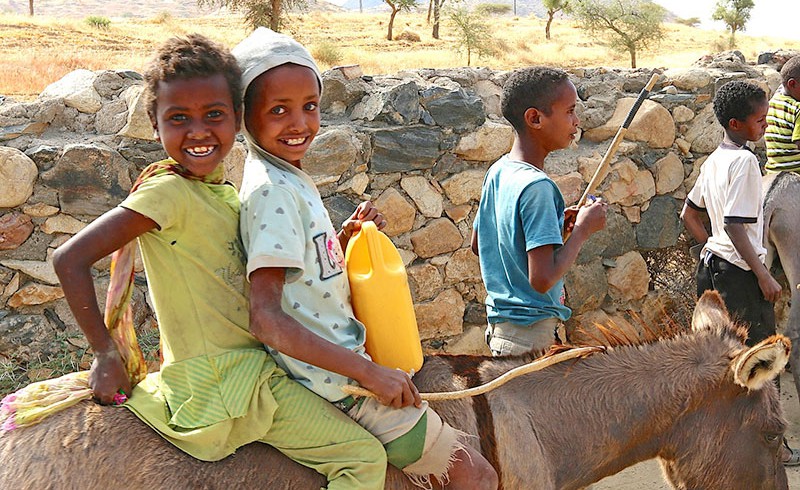
Outlook
Also in 2013, the work with the foundation’s horses on the farm “La Chevrie” continues. We look for volunteers and pursue the intensification of our existing contacts. The costs for care and accommodation remain manageable. They can be paid from the proceeds of endowment and donations as in addition the cost of public relations and management. Smaller project grants are possible. For further projects the current resources are not sufficient for the time being. We must continue to strive for a higher amount of donations.